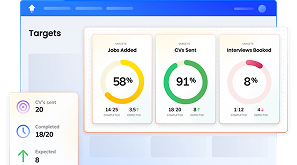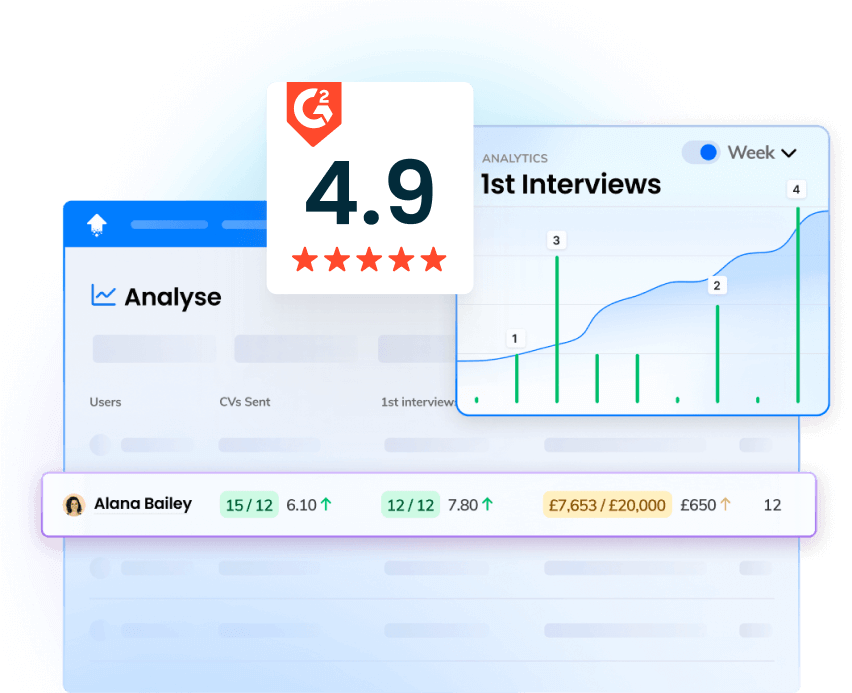Register for our Recruitment Remote Working Webinar Special.
I don’t need to open this article with the same lines that are being repeated on every post on the net right now (“the world has changed forever” being the most common). You know it has. I know it has. That’s all that needs to be said.
Over 100 companies (mainly recruiters) are using our platform around the world, and the majority of them have been asking for advice on moving to a fully remote working environment. With many having only ever known office-based work, this is a scary and worrying move, understandably.
Today I want to collate the advice we’ve been giving to clients (and non-clients, where they’ve asked) as a company that has had working from home woven into its DNA since day 1 all the way back in 2015.
- When we started up, my co-founder, our developer and I spent 3-6 months straight working from home. Fair to say this isn’t our first rodeo!
- We operate flexible working hours; staff have to be in 10am-3:30pm, otherwise we trust them to do what’s right by the company
- Working from home is given on request; we’ve never said no as again we trust our team to decide what’s best for them and best for us
With those things in mind, let’s jump into the learnings and ideas we think will be valuable in this (hopefully temporary) remote world we’re all moving to.
Make it fun (and it doesn’t have to cost)

Our VP Sales shared a delightful insight into what another (larger!) software company is doing now they’ve gone fully remote. All wrapped up in a rather humorous circular, some of the ideas are brilliant:
- Everyone has been bought a plant to grow and care for in the spirit of growth and health
- Daily challenges are posted in Slack that anyone can upload an entry to. Winner gets a $25 Amazon voucher
- Everyone receives an Uber Eats voucher every Wednesday to buy lunch with as they used to do team lunches (on the company) once a week
- Thursday afternoons are “virtual happy hours” – everyone grabs some drinks and has a good ol’ chit chat. Albeit behind a computer screen! These are all themed, making each one something interesting and varied
- Fridays are movie nights. Staff can watch the film together on Zoom, or watch in their own time over the weekend. Everyone submits a 15-second video review that is collated into a montage ready for Monday
For a starting point, that’s quite incredible. They plan to roll out more around quiz nights, book clubs, trivia nights and a ton more.
Get on regular video calls together
We only started our fully remote working schedule on Monday 16th March but the first thing I put in place was two calls a day, one at 9am and one at 1.30pm.
For each one, we all hop on Zoom together and chat for 30m. There’s no formal agenda, but I often start with summarising the government’s update from the previous agenda and take any questions. Things then devolve into casual chit-chat for 10m before we start wrapping up with help we need or problems people need solving.
I make the morning one compulsory to ensure we’re all starting the day as a team, but the 1.30pm one is optional based on if someone has a meeting to be on (or other business to attend to).

I’m not claiming this is the perfect formula, but coming up with a regular system for keeping faces and voices to names will help maintain the relationships developed in person.
Encourage ‘rituals’
I’m not suggesting you sacrifice your firstborn or ask your team to do the same. Rituals can be anything that has a regular cadence to it that get you in the zone. For us, it’s our 9am Zoom calls (more on those later). For others, it’s getting dressed into your work gear to acknowledge work mode is on.
It can be anything you choose, but be aware it might not fly with everyone. Speak to your team 1-on-1 and be honest. “I’m worried about how we’ll maintain our energy and environment we’ve built in the office – what do you think we should do at the start of every day to get us all aligned and motivated?”.
These can be baked into the Make it fun ideas you might have already come up with. Rituals don’t have to be boring!
My personal rituals fit more around a schedule but it keeps me focused and working to an agenda every day. In the spirit of sharing, here’s what it looks like:
- Wake up at 8am (one perk of no travel = more sleep (and later nights!))
- Check emails, reply to WhatsApp messages
- Out of bed and showered by 8:45am
- Bowl of cereal & a coffee on my desk at 8:55am
- First Zoom call 9am
The day then goes as usual. Linkedin, emails, development work, stakeholder management etc. Around 4:30pm I’ll head downstairs to sit and watch the PM’s address to the nation so I can update my team the next day on what was said and what that might mean for us. The evening is then mine, usually with some support given to our US clients about 11pm as well as some coding until about 1am.
Rinse repeat, and burnout is far less likely as it’s exactly the same as going to work. It’s what kept us going in those 3-6 months all those years ago.
Talk to your team
On the above point around updating my team on the government’s advice, this deserves a section of its own.
There’s a lot of chatter across social media around the government withholding information and not being able to trust them. Don’t put yourself in the same situation. Be honest with your staff.
My team are told every time the board speaks, they know the reality of the situation we all face, and they know our top priority is protecting jobs and keeping everyone safe. Tough questions are asked on Zoom calls and I answer them as honestly as I can – they deserve as much.
“Tough times don’t last; tough teams do” is my mantra for this trying time. Tough can mean letting the barriers down sometimes, and that’s totally okay.
Trust your team to deliver

It goes without saying that remote working only works on trust. You aren’t in an office and so you can’t see who’s slacking off or not putting in the effort you expect. One of the biggest fears we’ve seen fielded is “I don’t know if I trust my team to work as hard as they do in the office”.
A very fair fear, and not one we have a perfect answer to (does anyone?!). The best suggestions we have are to effectively engage and manage your staff. That means the regular calls we mentioned earlier, making remote work fun, and devising a way to monitor performance from afar. Speaking of which…
Monitor to manage
I didn’t set out intending to mention our product at all, but we’ve helped some of our larger clients get setup with remote reporting inside our platform. However, you can do this (albeit slower/less effectively) without a software solution.
Sit down with your managers and devise a basic-but-effective method for monitoring & reviewing performance. It can be a shared Google Sheet that you update once a day as a collective with reports from your CRM. You may already have a system like this in place, in which case great – you’re one step ahead!
Talk to your salespeople regularly; up the cadence of 121s. You have less travel/meetings to attend now so there’s even less excuse to not up the ante. Let them know especially that you’re always available to talk (or at the very least, that their line managers are). Cabin fever will kick in the longer this goes on so reminding staff they aren’t alone and demonstrating this regularly is essential.
Some may claim these measures contradict trusting your team. I check how many demos/deals my sales team are booking at least twice a week. Does that mean I don’t trust our VP Sales, Greg, and his team to deliver? Absolutely not! But if something does catch my eye that he missed, I can raise it with him. I either understand what’s going on better, or he has something to address. It’s not a stick, but more a health check.
Closing thoughts
Salespeople inherently need (and want) to sell. It’s a tough game when no one wants to spend cash on anything outside of loo roll and hand sanitiser, but keeping spirits high and building trust is essential to make the transition to remote working as smooth as possible.
If you’re a client of ours reading this, please do get in touch via support@oneupsales.co.uk and we’re happy to offer further advice and tips on using the platform for managing a remote team.
And to every business leader or manager, you aren’t alone – many other leaders are feeling the same as you and behind the words on a screen or the voice on the phone, we’re all human. You can reach out to me directly on LinkedIn if you want to chat.
Best of luck!
















